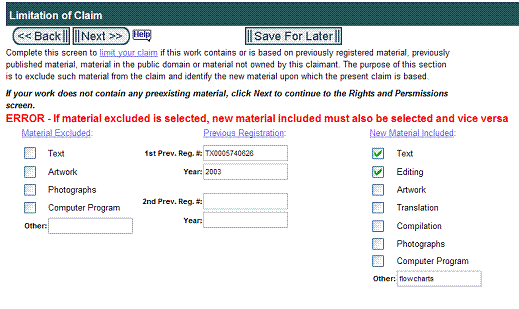Being the owner of a website that's largely designed with 1995 vintage software, I'm usually the last person to criticize website aesthetics. Unfortunately, something just isn't "right" with the Electronic Copyright Office site. From low resolution button text that looks like it came off a 9-pin dot matrix, to truly weird and irregular navigation between screens and forms, it looks like it was designed by a committee of crack smoking librarians. This is worse than the old Bowkerlink site. It locked up a couple times, especially at the end when all of the data was entered, and didn't wake up for five or ten minutes at a time. At the final screen, it never woke up, I had to log in again and was thrilled to find they'd actually saved the forms under "working" documents.
But the copyright office is phasing out all the good old forms, such as the TX and short TX forms most publishers use, and the VA (Visual Arts) form that I used one to register a poster. They've mainly been replaced by Form CO - Application For Copyright Registration. I'm guessing the CO may stand for Copyright Office. But they encourage everybody to use the online electronic registration instead, so I gave it a shot. The screens you go through are somewhat unfamiliar to regular Form TX filers, but they follow along the new Form CO fairly closely.
The online navigation is somewhat bizarre. Help options in large type appear where you would expect action items, and you only figure out they are help options by reading the small print or clicking on them, thinking you are getting somewhere. The whole process for me went something like this (I took notes).
Start - select "register a new claim" from the menu to the far right.
On the "Start Registration" screen, select the type of work in the small checkbox at the bottom of the screen - everything else is help, then click the 9-pin dot matrix printed "Next" button AT THE TOP.
Select "New" at the top - sort of a filler confirmation page.
Input the Title Type and Title, "Save" (all buttons continue to appear at top).
Review screen, hit "Next."
The next screen asks if the work has been published, if you select "Yes", the screen morphs on its own with no further action.
After you fill out the publication details, you hit "Next". This is the only screen where I noticed a note at the bottom saying to hit "Next."
On the Authors screen, hit "New" to get started, "Save" to move on.
Fill out authors and contribution type, hit "Next."
Claimants screen offers the "Add Me" option, didn't notice if it was available for Authors, hit "Save."
Review claimants, hit "Next."
Limitation of claims screen refers to previous registrations. I had to fill this out, and got bounced the first time, screenshot shown:

If you have trouble reading the error, it states "If material excluded is selected, new material included must also be selected, and vise versa." Somebody should get an award for that error message. What it meant is that they wouldn't let me proceed without excluding material from the original while adding material from the new revision. I didn't stop to agonize over the logic, it's just a form, but I suspect the logic would be flawed in some instances.
Rights and permissions included a bunch of highlighted fields that normally mean "You must fill these in to continue" in online forms. I skipped the contact phone number fields, and it let me proceed, when I hit "Next."
Correspondent was a "Next" followed by Mail Certificate which was an "Add Me" "Next".
Special Handling is where you can get express service if you're in litigation, trying to get customs to deal with the import of an infringing work, or facing a a funky deadline. Passed on with a "Next."
On Certification, I checked that I was authorized and chose "Upload Electronic" assuming that was the whole point of the exercise. Waited five or ten minutes while it locked up with no progress.
On what appeared to be the final screen, the hourglass never went away so I couldn't "Add to cart". Who the heck came up with "Add to cart" for a copyright registration?
In any case, I eventually logged in again, paid with a credit card, and moved on to electronic upload, where I found the information I'd failed to find previously, namely, that I couldn't submit an electronic deposit for a published paperback book!
The interesting thing is that in an earlier part of the process, they had a help link for what works could be deposited electronically, that took me to the overall guidelines for the whole copyright process, where I couldn't find the information I gave you at the top of this post. So, I'll send off two copies of the book next week with the form I printed that shows the transaction ID. I suppose the big upside is if you're neurotic, you could log into the electronic copyright office site twice a day for the next six months to check for progress. I am neurotic, but not like that.

